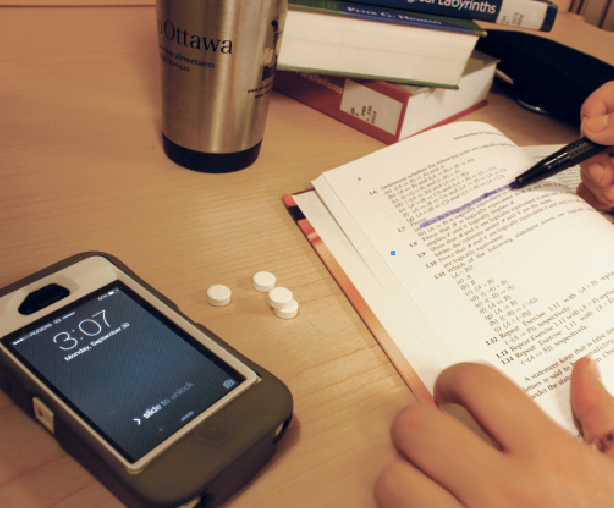There’s a new group of dopers in town, and they’re doing it for the grades
For many university students, the demands of academic life are stressful to say the least. To cope, some of us turn to liquor, chocolate (or any other comfort food), coffee upon coffee, or cigarettes. Some of us take caffeine pills to stay awake, sleeping pills to fall asleep, or anxiety pills to stabilize our frayed nerves. We’ll try anything to get us through our degree, especially if it gets us an A.
For more and more students, this list includes academic doping.
A new way to study
Academic doping is a term that refers to the use of brain-enhancing drugs such as amphetamine and methylphenidate in order to improve mental alertness, focus, or information retention. Academic dopers who use these drugs are doing so without a prescription.
Dr. Maria Rogers, an assistant professor and the director of the Attention Deficit Hyperactivity Disorder (ADHD) and Development Lab at the University of Ottawa, notes that drugs such as Adderall, Ritalin, and Concerta are typically used to treat ADHD, a disorder that affects approximately five per cent of university-aged adults.
“Although there are slight differences in how the various ADHD medications work, they all essentially work the same way,” says Rogers. “[They] increase levels of certain neurotransmitters in the brain that allow people to concentrate and focus better.”
For people with ADHD, these medications give an extra boost to calm the mind and focus on the task at hand. For those without ADHD, Ritalin (or methylphenidate, a psychostimulant drug) and Adderall (a mild form of speed also used to treat narcolepsy), sharpen the brain and give an extra boost while studying for a killer exam or finishing off a research paper.
Recent U of O graduate Pamela Sampson* says she often used Adderall, Ritalin, Vyvanse, and Concerta during her time at school to get through essays and while studying for exams. She compares the feeling to taking drugs like ecstasy, but with an added sensation of intense focus.
“Physically, I felt like I was extremely anxious and it drove me to chain smoke constantly,” she says. “However, I have never felt so productive or focused in my life. Large doses are a comparable feeling to other recreational stimulants such as MDMA, but surprisingly my mental capacity was enhanced despite the anxiety.”
How common is academic doping?
Given how difficult it is to maintain a high average in university, and given students’ propensity to attend school full-time, volunteer, and work all at once, the use of ADHD medication as a study aid is on the rise in both the United States and Canada.
In 2011, the National Post published an article which cited a survey conducted by McGill University of 400 students. The results suggested that 5.4 per cent of participants had used “study drugs” like Ritalin or Adderall for cognitive enhancement at least once in their academic careers. In the same year Maclean’s blogger Scott Dobson-Mitchell followed suit, posting information on academic doping and questioning the merit of using non-prescription ADHD medication to get ahead academically.
Though the issue is reported more frequently in the news, the majority of students don’t necessarily participate or even know about academic doping. Peter Keays, an economics and psychology student at Carleton University, says that academic doping isn’t exactly running rampant on university campuses.
“I don’t know of anyone that is taking study drugs,” he says. “Which isn’t to say that it doesn’t happen. People aren’t exactly open about that sort of thing. You certainly hear rumours of people using them.”
There has been a recent focus on the abuse of study drugs on Canadian campuses, like at the University of British Columbia and Western University. The Vancouver Sun and CBC have reported on students who wanted an edge during their studies. According to Rogers, however, there is currently limited research on the use of study drugs at the U of O.
“I have heard about [them] being used by University of Ottawa students during exam time, but we don’t have any statistics on our campus specifically,” she said. “Research done in other parts of Canada and the U.S. has shown that anywhere from seven to 15 per cent of university students engage in academic doping.”
There may not be any statistical information in regards to academic doping at the U of O, but according to Sampson, U of O students try it just as much as other students in Canada.
“Almost every student I know has used them at some point,” she says. “And all the dealers sell out around exam time, so I assume a ton of people on campus do them as well.”
It’s against the law
Although the statistics may seem minimal, Rogers contends there are other dangerous facts collected from studies on academic doping.
“While it is most prevalent on university and college campuses, it is now being seen in high school students as well, which is very alarming,” she says. “Although we don’t know for sure how students are getting their hands on these prescription medications, it is most likely from friends who have been prescribed the drug, or from someone who has stolen the medication illegally.”
Since study drugs aren’t over-the-counter, students who use the drugs recreationally without a prescription can get in serious legal trouble if they are caught using or distributing. Sampson got the drugs mainly from dealers, but also from friends with prescriptions.
Amphetamines and methylphenidates are currently controlled under the Controlled Drugs and Substances Act (CDSA), Canada’s federal drug control statute. The Act states, “Except as authorized under the regulations, no person shall possess a substance included in Schedule I, II or III.”
Methylphenidates are listed as Schedule III drugs, which means they require a prescription or license for legal possession. The maximum punishment for possession of a methylphenidate such as Ritalin is up to three years imprisonment.
Under Bill C-10, commonly known as the Safe Streets and Communities Act passed by Parliament in March 2012 to make amendments to the CDSA, amphetamines like Adderall are listed as Schedule I drugs and have a maximum punishment of seven years imprisonment for possession without a prescription.
There are consequences
Nonetheless statistics seem to indicate that recreational use of Adderall and Ritalin on college and university campuses is on the rise.
For anyone who’s seen the movie Limitless, the pros of academic doping seem clear: you pop a little pill and your brain is working at maximum capacity for the next few hours, allowing you to achieve that A+ grade, excel at work, and clean your apartment all without getting tired. Surely, there must be a number of potentially positive benefits to taking brain-enhancing drugs.
But taking ADHD medication, even in the short term, isn’t all it’s cracked up to be.
“Taking stimulant medication without a prescription can be very dangerous,” says Rogers. “Large doses of stimulants can lead to psychosis, seizures, and other serious medical problems. When combined with alcohol, stimulants may create a sensation of less drunkenness and euphoria, which can lead to excessive drug and alcohol consumption, possibly resulting in overdose.”
Taking stimulant medication illegally can lead to a number of negative side effects, including insomnia, anxiety, depression, strokes, and diarrhea. Drugs like Adderall and Ritalin are habit-forming drugs and can lead to addictions. Adderall has even been labelled a gateway drug that can lead users to harder drugs like cocaine.
For example, in February of this year the New York Times reported on 24-year-old Richard Fee from Virginia Beach, Va., who hung himself in his bedroom closet due to an Adderall addiction. He became addicted to an ADHD drug in college and after spending a week in a psychiatric hospital in 2011, he committed suicide a few weeks after his prescription expired.
Is it moral?
Is academic doping simply another way to give yourself an advantage in a time when, due to economic instability, every advantage counts? Or is it immoral, dangerous, and even a form of cheating?
Keays believes the argument is two-tiered. He says that on one hand, people who use study drugs still have to write their own papers and study to learn the material to pass an exam.
“On the other hand,” he says, “people are gaining a competitive advantage by using something that’s not available to everyone. But you could say the same thing about students who can’t afford a tutor or have less time to study because they need to work.”
U of O regulations on academic fraud, which contain clauses on items such as plagiarism, falsifying research data, and “any other action for the purpose of falsifying an academic evaluation,” cites a number of punishments for infractions. These include a failing grade on an assignment, a failure in a course, loss of credits for the academic year, expulsion from the U of O for at least three years, and even the revocation of a degree. However, there are currently no explicit rules against taking non-prescription study aid drugs in these regulations.
For Sampson, academic doping has never been an ethical issue, but just another way to study and efficiently complete the necessary hours of homework for students.
“I’ve never considered it cheating, simply using my time effectively,” she says. “Why would I spend 10 days writing a paper when I could spend 10 hours?”
While the ethics behind academic doping remain unclear, the reasons students are taking study drugs are a little more straightforward.
“I think some people are going to try to get any advantage they can,” says Keays. “Getting into a graduate program can be very important and extremely competitive. Faced with that kind of pressure I can completely understand why people would take drugs if they thought it could raise their GPA a few points.”
Until universities start moving towards a better work-life balance, or start implementing anti-academic doping policies, or administering urine tests at the beginning of exams, the decision to take brain-enhancing drugs is ultimately up to the individual.
*Name has been changed
—With files from Tori Dudys
If you’re looking for healthier ways to deal with your stress and time management head on over to our tumblr




